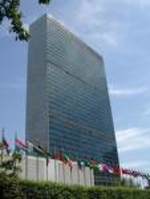Assessing UN Action on Iran and North Korea
Posted by Jordan Tama
2006 was a bad year for American foreign policy, marked by our inability to stop the escalating civil war in Iraq, worsening violence in Darfur, and the continued decline of our international reputation. But we also had a couple of important diplomatic achievements that haven't got as much attention as they deserve: the passage by the UN Security Council of targeted sanctions against North Korea and Iran for their nuclear programs.
After North Korea's nuclear test in October, the Security Council voted unanimously for sanctions that ban the transfer of nuclear materials to North Korea, bar international travel by officials associated with North Korea's weapons programs, and freeze the overseas assets of those officials. The resolution also authorizes countries to inspect cargo going in and out of North Korea to detect illegal weapons. Eight days ago, the Security Council unanimously approved a less stringent sanctions package on Iran, including a ban on the import and export of nuclear materials and a freeze on the assets of some Iranian individuals and companies.
In both cases, the U.S. had pushed for tougher sanctions, while Russia and China had sought weaker ones. The results were painstakingly negotiated compromises that satisfied no one but represented significant diplomatic achievements considering the wide divergence of views among Security Council members. The sanctions won't stop North Korea and Iran from moving forward with their nuclear programs, but they will slow them down by making it harder for them to acquire needed materials and complicating the work of officials involved in nuclear efforts.
The bigger benefits might be political. In Iran, the sanctions already have contributed to growing discontent with President Ahmadinejad, as some Iranians blame him for unnecessarily isolating their country (though most Iranians support Iran's nuclear program). In East Asia, the sanctions have shown North Korea that its most important patron, China, is willing to cooperate with North Korea's enemies to punish it for recalcitrant behavior.
Continue reading "Assessing UN Action on Iran and North Korea" »





